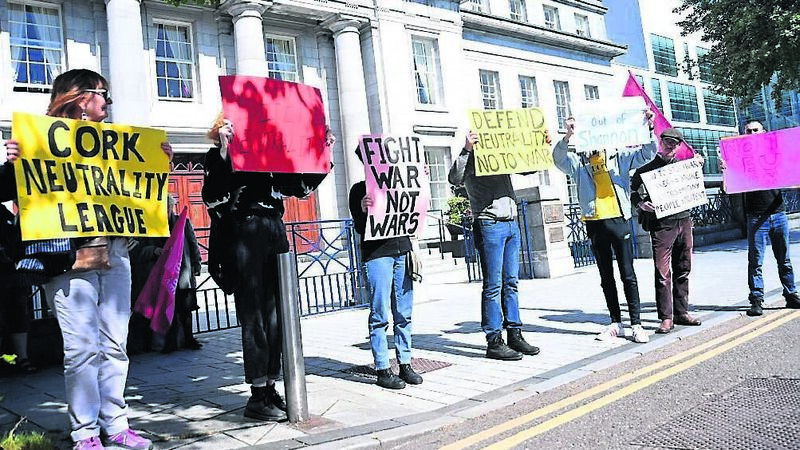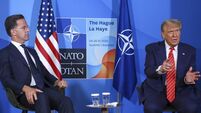Why we must oppose threats to neutrality

Protesters from the Cork Neutrality League outside City Hall last year
IT’S encouraging that most working-class people in Ireland remain committed to Irish neutrality.
They don’t want Ireland to become embroiled in a future war because they fear the loss of their children, either as soldiers or as civilian casualties.
Nor do they wish to see the children of other countries suffer - in this sense, working-class people are internationalist. They understand they have nothing to gain from war and will most likely be the biggest losers.
They also worry about increased tension between the West and China, which they understand is leading towards a third world war, and they are naturally terrified of nuclear war.
The Irish establishment prides itself on seeing the bigger picture, and has lately been indefatigable in promoting it. By their account, Ireland’s economic miracle was the work of the US and the EU - that is, the Western Alliance.
But there’s no such thing as a free lunch, and Ireland must now step up and be counted as a fully fledged member. Supposedly, this is a matter of the greatest urgency. Russia is said to threaten us in every domain - in the air, at sea, on land and in cyberspace - and war with China is on the horizon.
Who exactly is pushing the new line on neutrality?
Generalising, of necessity, it’s the right-wing political parties in government (Fine Gael and Fianna Fáil), the top ranks of the Defence Forces (with retired officers often speaking on their behalf), the upper echelons of the civil service (particularly within the Departments of Foreign Affairs and Defence), most of the Irish media (even when attempting to give the impression of impartiality), lobbyists for military-industrial companies, the top professionals (company executives, judges, hospital consultants - not all of them, of course), and large swathes of the salaried middle classes: lawyers, doctors, accountants, and so on.
Their shared ideology, neoliberalism, has served them well, and they accept its inherent drive to war. They see it as the price that must be paid to ensure the continued dominance of the Western Alliance.
They’ve also been stung by criticism in Western foreign-policy circles that Ireland is ‘not pulling its weight’ (that is, not spending enough on its military) and is the ‘weak link’ in European defence. They seem in full agreement with the dictum of George W. Bush: “If you’re not with us, you’re against us.”
The government knows its constant erosion of neutrality in favour of the Western Alliance means that Ireland is now seen as, effectively, a full member, and should expect to be targeted in future wars. Rather than reverse course - to fully embrace neutrality and non-alignment - the government is intent on rectifying these anomalies, as they see them, by ditching neutrality, joining an EU common defence pact, and adopting a military posture compatible with eventual NATO membership.
Ireland is not to be protected by an armed citizenry fighting a guerrilla war, but by mutual-assurance military pacts: if you’re attacked, we’ll fight with you, and if we’re attacked you’ll come to our rescue. The EU Mutual Defence Clause and Article 5 of the NATO Treaty are set to replace Irish neutrality.
Fortunately, the ordinary people of Ireland constitute an important stumbling block to the above. Even after a year of scaremonging about Russian ships menacing Ireland from more than 200 miles off our coast, about the possibility of Russia invading every single European country if it prevails in Ukraine, and about Russian hackers crippling Irish cyberspace and threatening subsea cables, if a neutrality referendum were held tomorrow, it’s likely a majority would still vote to keep it.
If pressed about specific defence issues, many working-class people would likely respond that they don’t see Ireland as being particularly vulnerable to invasion. They know doubling the size of the Irish army won’t make much difference, but that - like the Swiss - everyone could be trained to shoot and keep a gun at home in case of an invasion.
Despite the propaganda, most working-class people can also see that the Russians will be lucky to get out of Ukraine in one piece, never mind continue their world tour.
Many ordinary people know, too, that a country only controls its waters up to three miles from its shore and that anyone can sail through Ireland’s massive economic maritime zone - the Russians, the Americans, anyone. And protecting cyberspace is a police issue - it doesn’t require soldiers attired in camouflage fatigues.
A citizens’ assembly on neutrality was mooted soon after the war in Ukraine began, but scotched when it became obvious that it would most likely recommend that neutrality be kept and actually enhanced, that its erosion be halted and reversed.
But then someone in the bowels of government came up with the idea for a handful of ‘consultative forums’ to give the impression the public is to be consulted, followed by a report by Dame Louise Richardson DBE. We believe this will undoubtedly recommend the abolition of the Triple Lock (which governs Irish military operations), and most likely advocate greater Irish integration into EU military arrangements. It could go as far as recommending the total abandonment of neutrality, perhaps even calling for the upgrading of Ireland’s semi-detached membership of NATO (through the misnamed Partnership for Peace) to full membership of the alliance.
This is a turning point in Ireland’s history. Those of us who wish to maintain neutrality should be clear as to why.
Some defenders of neutrality have lionised Ireland’s peacekeeping forces abroad and offer this as the main reason for staying neutral. Yet the political basis for these peace-keeping missions is highly questionable.
The UN only keeps the peace when and where the permanent members of the Security Council - America, Russia, China, Britain and France - permit it. Nevertheless, Ireland has a voice in the UN. It should align with the non-aligned, oppose war and promote peaceful resolution of conflicts.
Ireland should resign from all EU military arrangements and NATO’s Partnership for Peace. It should demand the demilitarisation of the EU and the disbandment of all military alliances, including NATO.
Clearly, Ireland’s ruling class will not agree to this. It’s therefore up to working-class organisations to defend neutrality and to put a stop to the increasing militarisation of Ireland and the total absorption of the country into the US sphere of interest.







 App?
App?




